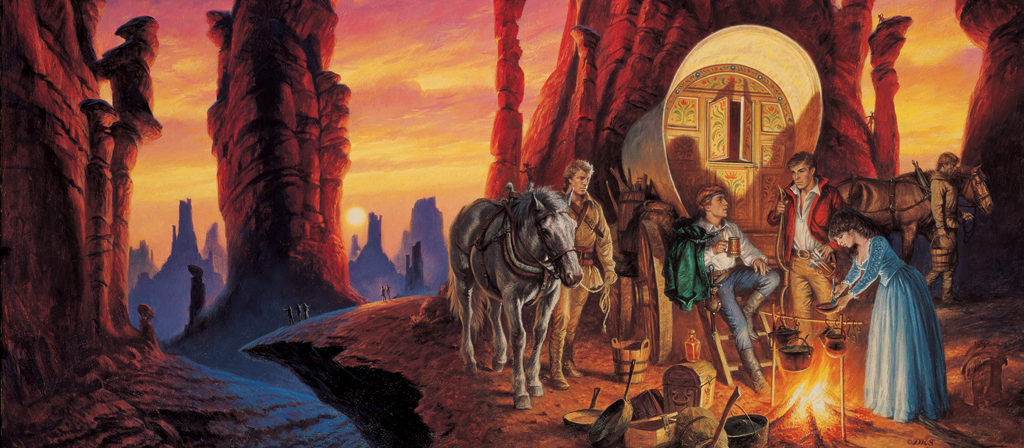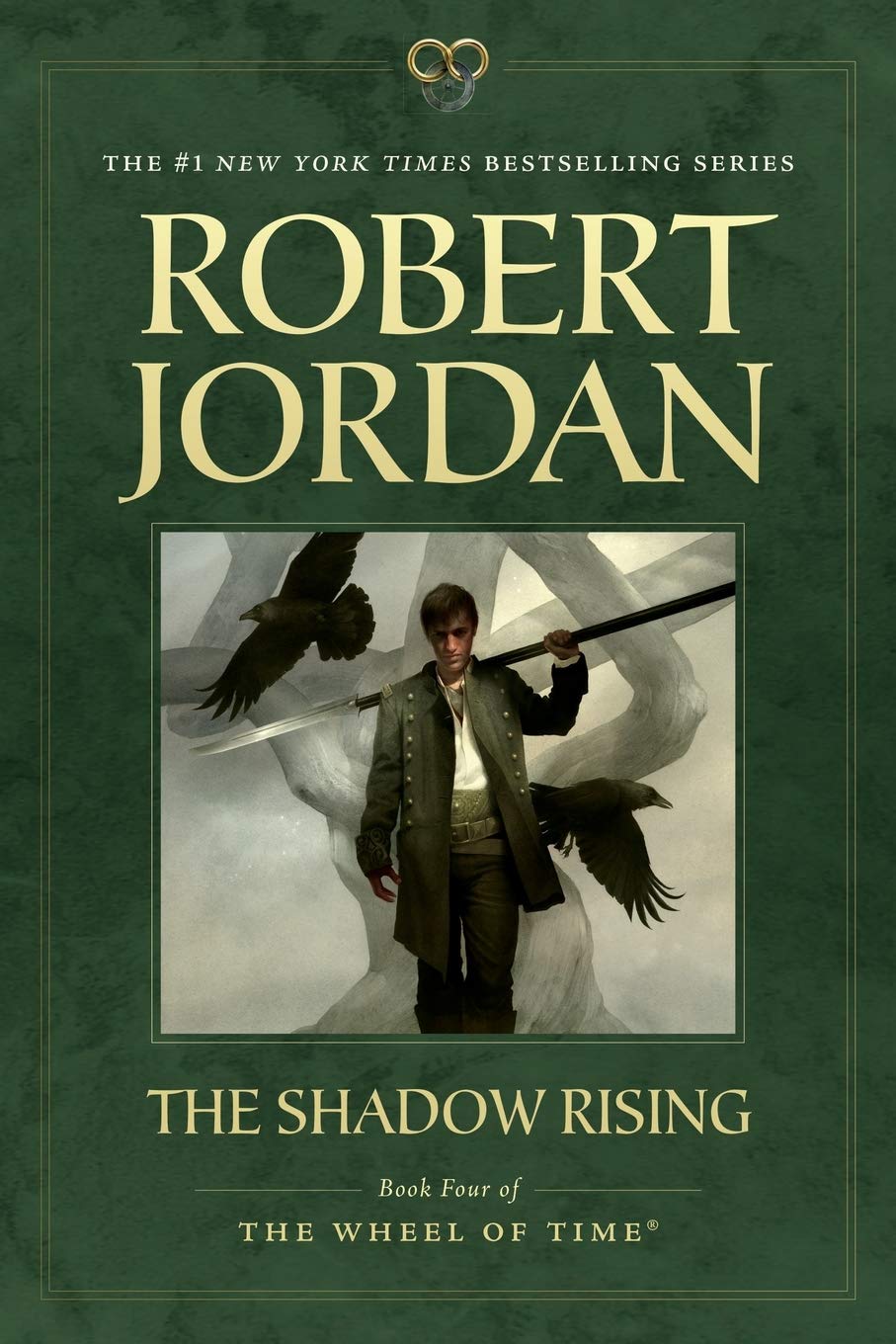

“You read too much and understand too little.”
Many fans of The Wheel of Time point to the fourth book as their favorite in the entire series. That being the case, I was looking forward to Robert Jordan streamlining his bloated narrative style and giving readers a legitimately great book; one that cut the dross, focused on developing his vast fantasy world and refining his ballooning cast of characters. I should have known better, because most of the people who think The Shadow Rising is the crown jewel of the series also think the first three books qualify as minor masterpieces themselves. Once again, the standard Jordan plot trajectory rears its head—decent beginning, listless middle, strongish ending. The entire book seems to be setting up a few visually intriguing scenes, doing so in such bland fashion that the drama is sucked right out of those key moments. Characters’ childish internal monologues dominate and the tone shifts around so much that one can never really get a read on any character, let alone discern their motivations. The Shadow Rising is a novel-length failure to heed the old adage “show don’t tell.”
The basic problem with The Wheel of Time thus far in the series is that without filler, the contents of the first four books comprise enough material to fill approximately one of Jordan’s door-stopper tomes. In the first couple of books, it was not that difficult to get somewhat pleasantly lost in the insane amount of detail in Jordan’s world. The vast maps and references to myths made it seem that the author had a rich and detailed world already in place that he was uncovering for us through the eyes of a few young adult main characters. It was easy to overlook that those characters were basically insufferable and that Jordan could barely write dialogue. Well, maybe it’s unfair to call the characters insufferable. They began their literary lives as uncertain do-gooders unwillingly pulled into legend, but now that they’re wielding magic, fighting gigantic horned beasts, and time-travelling, you would think they’d have some nuanced thoughts and complex emotional responses. Nope. Their actions are dictated by two needs: to have certain characters in certain places at certain times, and to ensure that all the main characters are doing something every few chapters. Hence we get to read about Perrin slinking around the city’s bars, listening to gossip in hopes that he will hear about an adventure so intriguing that Faile will leave him for it; for her own safety, of course, despite the fact that she’s extremely competent in combat. This is the same Faile that suddenly became his girlfriend in The Dragon Reborn without any romantic arc, and who spends half of The Shadow Rising not speaking to him because they’re both in junior high, apparently. I hate to say this, but the Perrin-Faile relationship is the most well developed in the book. Yikes.
Rand, the Dragon Reborn, is once again notably absent from many of the book’s pages. Early on, he is randomly given governmental control of a major city, then daydreams of Min and Elayne during discussions with his councilors. He gets attacked and seduced and studies ancient texts and goes on a journey with Mat. Some interesting stuff, but not the stuff you’d expect from a fifteen year old shepherd who has recently accepted a prophesied mantle which dictates that he will save the world, succumb to madness, and take his own life. If Rand is dealing with that weighty subject, it is not happening on the page. Instead, Jordan introduces—cue LeBron’s welcoming party in Miami—not one, not two, not three… I actually don’t remember the exact number, but there’s like, a profusion of adolescent babes whose primary narrative purpose is to serve as love interests for Rand. As usual, we read about the cuts of their dresses, the smoothness of their skirts, the curl of their hair—all the important stuff.
Jordan also has a stubborn resistance to writing dynamic characters. He routinely puts his characters in situations where they have the opportunity to act in a way that indicates they have learned from what has happened previously. They invariably do the exact same thing that they have the entire time, as if each time he wrote a scene he pulled out his character index cards that list the three traits that define each of them, and made sure he did not color outside of those lines.
I think part of the issue is that Jordan simply cannot write women or relationships. Like at all. You can at least tell Rand, Mat, and Perrin apart from one another, but the women are all almost the same exact person. Characters of both sexes regularly make decisions that seem unintelligent for the sole purpose of a member of the opposite sex to complain that “they just don’t understand (wo)men.” He also has a propensity for just kind of throwing up his hands and saying, “welp, these two characters are an item now,” without taking time to develop anything resembling a relationship. Within the span of a chapter, give or take, Elayne and Rand go from not really ever having a conversation to frequent canoodling and the writing of love letters. And this isn’t isolated to Elayne—Rand’s got so many young women lusting after him that he will probably have to convert to Mormonism by the time this series is over. And boy oh boy does Jordan like to make the ladies in his books get naked—the worst case in Shadow is when Moiraine and Aviendha are inexplicably forced to strip on a journey to an Aiel city, while Rand and Mat—the latter of whom was all but denied passage—are allowed to go fully clothed.
The part that irks me the most is that I think the idea of this series in the author’s head was actually probably brilliant. I would have loved to have sat down with Robert Jordan and let him spend four hours in an endless spiel about the setting, themes, and general arcs of the story he wanted to tell. There are several great scenes lost within this thousand page sprawl, that, presented in a better light, I would probably have really liked. One that stands out is when Rand finds himself—his spirit? It isn’t really explained—traveling through time and living short episodes of the lives of people who I assume were his ancestors. During this section we are briefly introduced to a past technological golden age where the characters speak of futuristic innovations offhandedly and allow us to fill in some blanks in our minds as to what exactly we are looking at. It is strange though, because you can tell Jordan is intentionally leaving details off the page so that these things—jo-cars, the Sharom—are veiled in mystery, but he still chooses to provide us with unending meaningless details that just clog things up. Throughout the book, the plodding pace puts such large gaps between meaningful events that the narrative loses most of its cohesion, and plot twists are so easy to guess that when they occur it’s easy to overlook that they were even intended as twists.
I’ve said it before but it bears repeating because I think it sums up my feelings about the series so far—Robert Jordan was a good “ideas guy” but a lousy writer. The overarching plot, themes, and fantasy trappings of The Wheel of Time seem pretty good. But the uncertain tone, the hand-holding writing style, the filler, the clunky prose… it’s almost an impossible task to overcome these faults. That didn’t stop him from trying, and I’m hoping I can steel myself to face the rest of the series because I think there is still a good story hidden within these endless pages.